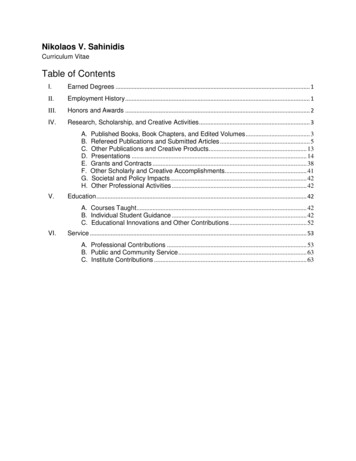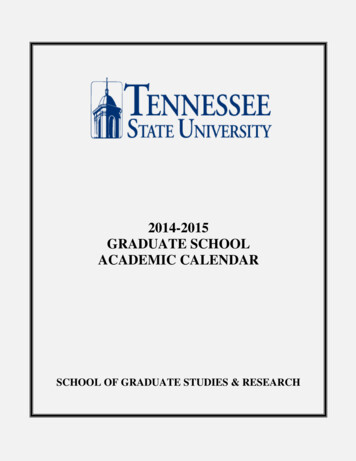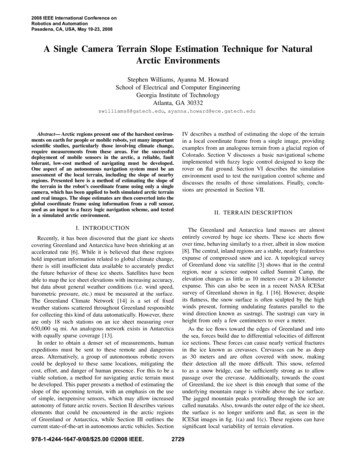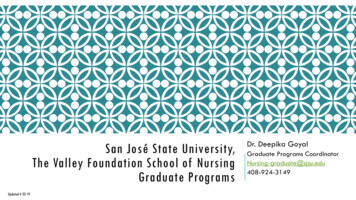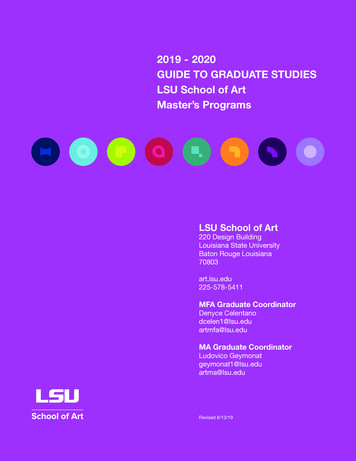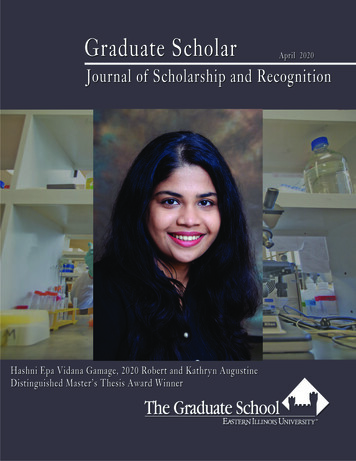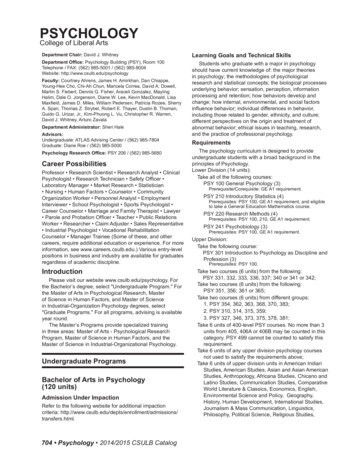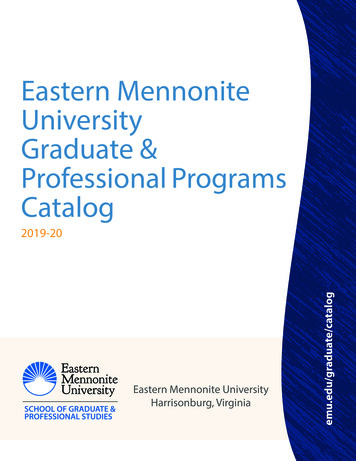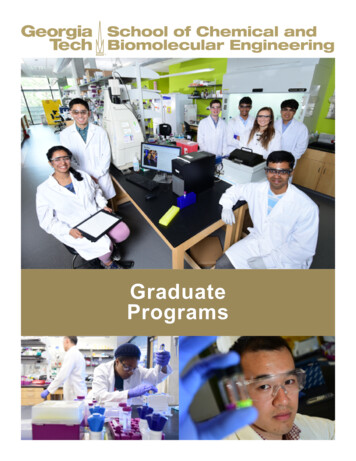
Transcription
GraduatePrograms
About Georgia Tech’sSchool of Chemical & Biomolecular Engineering (ChBE)Think Big.Solve Big.Established in 1901, theSchool of Chemical and Biomolecular Engineering (ChBE) isconsistently recognized as oneof the top chemical engineeringprograms in the nation. And westill have big ambitions.We continually strive to bethe best – to produce the finestengineers, to conduct the mostinfluential research, and to solvethe world’s toughest problems.With faculty members whoare leaders in their fields, stateof-the-art research facilities,and numerous opportunities forinterdisciplinary collaboration,our Graduate Program will position you at the leading edge ofinnovation.Table of Contents3PhD/MS Programs5GT-EQUAL6Online Certficate in DataScience for the ChemicalIndustry7Research Areas9Graduate Careers –Academic & Industry12Internships & ProfessionalPreparation13Faculty Research Interests14 About Atlanta1SCHOOL OF CHEMICAL AND BIOMOLECULAR ENGINEERING, GEORGIA TECHWe offer financial assistanceto all of our PhD students, providing exceptional opportunitiesto extraordinary people.ChBE faculty members areinvolved in a comprehensiverange of topics in education,research, and commercialization,with a strategic focus on energy& sustainability, biotechnology,materials & nanotechnology, andcomplex systems.Ranked in the top 5 engineering programs in the nationfor both its graduate and undergraduate programs by U.S. News& World Report, the School isone of the oldest and most diverse programs in the nation.
STRENGTH & BREADTHChBE by the Numbers#5Best Graduate Chemical EngineeringProgram in the Nation- U.S. News & World Report, 2021#6#7Best ChemicalEngineering Departmentin the World- Shanghai RankingConsultancy, 2021GT’s ranking inAmerica’s Best PublicUniversityStudent Statistics18National ScienceFoundation CareerAward winners on thefaculty- U.S. News & World Report,2021230 graduate students(2020-2021)- 209 PhD & 21 MS14 NSF Fellows92 women students44 Black, Hispanic, andNative-American studentsFaculty Statistics23ChBE faculty membershold major editiorialpositions with toptechnical jounrals71040 faculty members(12 women)6 affiliated faculty3 academic professionalsFaculty memberselected to the NationalAcademy ofEngineeringAIChE Fellowsserving on the faculty:CHBE.GATECH.EDU2
PhD/MS ProgramsThe School of Chemical and BiomolecularEngineering offers graduate programs involving advanced-level coursework and independent research leading to MS and PhD degreesin chemical engineering. The MS degreecan usually be obtained by coursework only,without a thesis. Course selection for both theMS and doctoral degrees is quite flexible, withindividual plans of study developed for eachstudent.Research opportunities exist in a broadrange of areas of importance to chemical engineers and society, including catalysis, reac-3tion kinetics, complex fluids, microelectronics,microfluidics, optimization, bioinformatics,polymers, sustainable development, pulp andpaper, separations, CO2 capture, biomedicine,solar energy, thermodynamics, environmentalscience, reaction engineering, cancer diagnostics and therapeutics, biofuels, air quality,data-driven modeling, and process synthesisand control.Furthermore, the School of Chemical andBiomolecular Engineering participates withother schools in offering MS and PhD degreesin Bioengineering.SCHOOL OF CHEMICAL AND BIOMOLECULAR ENGINEERING, GEORGIA TECH
PhD ProgramMS ProgramPhD ProgramMS ProgramThe PhD program in ChBE forges a close professional relationship between graduate studentsand faculty members. Working together on cuttingedge research, you and your faculty mentors willdevelop an academic and research program tailored to meet your individual needs.Although the typical program takes aboutfive years to complete, you may finish the requirements in slightly less, or more, time.We offer financial assistance to all of our PhDstudents, providing exceptional opportunities toextraordinary people.PhD students at Georgia Tech ChBE can earndoctoral degrees in: Chemical and Biomolecular Engineering BioengineeringThe MS program in ChBE is a courseworkbased, non-thesis degree designed for studentswho want to develop a deeper knowledge of thefundamentals and learn about emerging applications. It is ideal for students who plan to enterindustry or who are returning to school afterworking in industry.The MS program requires 31 hours of coursework, which can be completed in two or threesemesters (see the schedule below), depending onthe student's pace and the availability of electivecourses of interest.Students admitted to the MS ChBE programdo not do thesis research and are not eligible forChBE graduate research assistant positions ortuition waivers. Thus, it is a self-paying program.Just like PhD students, MS students can take advantage of Georgia Tech's Career Services, whichhosts career fairs and connects students with thelarge number of employers that come to GeorgiaTech seeking talent.Note: Applicants who do not have a ChBE orequivalent BS degree should read the informationat the bottom of the MS Degree Requirementspage, under “for applicants without a BS chemicalengineering degree.”To read frequently asked questions andlearn more about the specific curricula forour graduate programs, minors offered,and other details, please visit this DU4
GT-EQUAL:Graduate Training for Equality inUnderrepresented Academic LeadershipThe GT-EQUAL Program is one of two sites atGeorgia Tech for the American Chemical Society’s(ACS) Bridge Program, which aims to increase thenumber of Black, Hispanic, and Native-Americanstudents who receive doctoral degrees in chemicalsciences.GT-EQUAL is based in the School of Chemicaland Biomolecular Engineering (ChBE), while another Bridge site resides in the School of Chemistryand Biochemistry.The GT-EQUAL Bridge Site enrolls at least twoBridge Fellows annually who will earn a thesis MSin chemical engineering while receiving full funding,extensive support, mentoring, and training to prepare for success in a PhD program.ChBE was one of the two programs nationwideselected in 2019 to become the inaugural sites forthe ACS Bridge Program. Apply here.The Bridge Program came about after ACSjoined the Inclusive Graduate Education Network(IGEN), a coalition of five scientific societies formedto bolster the number of underrepresented students in the physical sciences, in 2019. In 2020, theSchool of Chemistry and Biochemistry at GeorgiaTech has also become a Bridge site.The ACS Bridge Program supports this national effort by assisting chemical science departmentsin creating a “bridge” for these students to earn theirdoctorates in chemistry or chemical engineering.5“I’ve really appreciated the support system,” saysAlexa Dobbs, who started as a Bridge Fellow in 2019.She received tutoring when she needed it as well asprofessional development support from professorsand the mentorship of another graduate student whowas paired with her. “They’ve been really helpful innavigating issues.”SCHOOL OF CHEMICAL AND BIOMOLECULAR ENGINEERING, GEORGIA TECH
Online Graduate Certificate in Data Sciencefor the Chemical IndustryChemicals, energy and manufacturing companiesaround the globe are racing to take advantage of the bigdata trends in what has become known as Industry 4.0.A key need in this sector is professionals with strong domain knowledge in chemical engineering who are skilledin the tools of data science and can lead data-driven efforts in their companies.In 2019, ChBE launched a fully online GraduateCertificate that will equip professional chemical engineers for this critical field. This program is availableto non-degree students and core courses are taught byChBE’s world-renowned faculty.What is a graduate certificate at GeorgiaTech?A graduate certificate is comprised of 12 credithours of coursework, typically 4 3-credit hour courses.For comparison, a Master’s degree requires 36 credithours of coursework. Credit from a graduate certificatecan be used towards a future Master’s degree at GeorgiaTech.What courses are offered in the DataScience for the Chemical Industry graduatecertificate?All students will complete two core courses thatwill focus on foundational data science methods with astrong emphasis on applications in the chemical processindustry. Students will then select two elective coursesfrom a wide variety of courses that are already availablewithin Georgia Tech’s highly successful online Master’sdegrees in Data Analytics and Cybersecurity.How long will the graduate certificatetake to complete?Most students will complete one course per semester, so the certificate will take 4 semesters to complete. Core courses will be offered in the fall and springsemesters, but elective courses may also be available inGeorgia Tech’s summer semester.Are these courses suitable for people whoare working full time?Yes. The course delivery and structure will besimilar to Georgia Tech’s existing online MS programs,which currently serve thousands of working professionals.Are the courses easier than regular college-level classes?No. Each course is also part of Georgia Tech’sgraduate curriculum and will require serious effort bystudents. But careful attention has been paid in developing the core courses to ensure that they are accessible to students who have an undergraduate degree inchemical engineering or a related discipline.What will tuition be for this certificate?Tuition and fees will be charged using GeorgiaTech’s standard rate for Professional Educationcourses. Although we note that these tuition rates areadjusted incrementally each year, with this cost thecomplete 12 unit graduate certificate can be completedfor about 15,000. Current ChBE graduate studentscan earn the certificate at no additional cost.CHBE.GATECH.EDU6
Our School’s research isremarkable for its quality andinnovation, as well as its depthand breadth. Our award-winning faculty’s range of interestsinclude both traditional andemerging areas of research.The school boasts a diverseset of research projects, witheach professor leading a groupof students investigating a variety of interdisciplinary topics.Our faculty members focusResearch Areason four strategic areas — energyand sustainability, biotechnology, materials and nanotechnology, and complex systems — whileincorporating elements of classicalengineering principles into theirwork, such as thermodynamics,fluid mechanics, kinetics and reaction engineering, separations, andtransport phenomena. Not only isour research large in scope, it alsoBiotechnologyBiotechnology research combines biologicalsciences, chemistry, and chemical engineering tosolve practical problems in the fields of medicine,agriculture, and bio-based fuels.ChBE researchers develop novel approachesto transform health care and pharmaceuticals,as well as opening up numerous possibilities forsustainable resource management.7has the potential to make a bigimpact on the world.Current projects in theschool address some of the largest global challenges of the 21stcentury, including developingnew therapeutics for diseases,designing sustainable systemsfor improving the environment,and creating more efficientmethods for producing new andbetter technologies.Complex SystemsComplex Systems research aims to designefficient systems that are safe and adaptable withapplications in a variety of research areas andindustries, including supply chains, environmentalsystems, and manufacturing.By using mathematical tools to simulateprocess behavior and identify optimum operatingconditions, ChBE researchers design novel systemswith improved economy, reliability, and safety.SCHOOL OF CHEMICAL AND BIOMOLECULAR ENGINEERING, GEORGIA TECH
Energy and SustainabilityEnergy & Sustainability research addressesthe challenges in developing systems and products that meet the energy needs of society whileconsidering environmental impact and economicfeasibility.ChBE researchers create technologies thatgenerate, distribute, store, consume, and recycleenergy and materials in a cleaner and more efficient manner.Materials and NanotechnologyMaterials and Nanotechnology research focuses on creating new materials that improve construction and performance of devices in numerousindustries, including healthcare, electronics, andenvironmental management.Manipulating atoms, molecules, and supramolecular structures allows ChBE researchers togenerate larger structures with superior features.CHBE.GATECH.EDU8
Graduate CareersA PhD in chemical engineeringfrom Georgia Tech’s Schoolof Chemical BiomolecularEngineering (ChBE) is excellentpreparation for a career inacademia or industry.Many of our PhD alumni haveobtained faculty positions at manyleading institutions around theworld. And thanks to our strongindustry ties, our graduates earnjobs with top companies in a widerange of industries year after year.All the top companies recruit fromChBE.Whatever career path youchoose, ChBE’s graduate programsoffer many benefits:Top Quality Research & TeachingYou will conduct cutting-edgeresearch with top faculty who willchallenge you to be your best. Youwill also be able to take advantageof numerous opportunities to collaborate with experts in core andfrontier areas of chemical and biomolecular engineering and otherdisciplines at one of the nation’stop universities.You will learn to be a betterteacher by watching our faculty,who are passionate about teachingboth undergraduate and graduatestudents.Big NetworkBeing part of one of the biggestchemical and biomolecular engineering programs in the nation’slargest college of engineeringmeans you are going to be part of ahuge alumni network. About 7,500of those College of Engineeringalumni are currently in senior levelpositions, such as CEOs, CIOs,CEOs, presidents, executive vicepresidents, and board chairs.9Career ServicesGeorgia Tech’s Career Servicesoffice exists to help you get into thecareer of your dreams. They offer numerous events and services,including career fairs, mock interviews, seminars, and counseling.Leadership DevelopmentStudents learn to be betterleaders by supervising and mentoring undergraduate researchers.Additionally, AChEGS, and otherstudent organizations provide opportunities to develop leadershipskills.ConferencesMost of our students presenttheir papers at research conferences that provide opportunities todevelop a network of contacts.Publication in Top JournalsIt’s not just for building anacademic CV. Industry also appreciates the fact that our PhD students regularly publish their workin top journals.Graduate SymposiumThis annual event bringstogether industry and academiaover a day and a half for discussion, recruiting, and networking.Participants present their researchto representatives from numerouscorporations, including Fortune 500companies.Technical CommunicationsProgramEmployers in industry haveconsistently ranked communicationskills as one of the most importantattributes for employees. This program will give you the tools youneed to be successful in any job.“One of the great advantagesof Chemical Engineeringis that it is very broadlyapplicable. Having a ChemicalEngineering backgroundhas prepared me to workin different researchareas: colloidal science,microfluidics, and systemsbiology. It is important to havethe support and guidance ofProfessors that believe in whatyou are doing, such as mymentors Dr. Hang Lu and Dr.Sven Behrens.Another piece of advice isto not be afraid of exploringnew research avenues oropportunities. In fact, it maybe crucial to pursue those newopportunities and researchavenues, even if it is a bitscary.”- Dr. Adriana San MiguelDelgadillo, PhD 2011, AssistantProfessor, North CarolinaSCHOOL OF CHEMICAL AND BIOMOLECULAR ENGINEERING, GEORGIA TECH
SelectUniversities WhereRecent ChBE PhDGraduates AreProfessorsFor Academic TrackWorkshops on Finding a Job inAcademiaEach year, ChBE faculty leadworkshops teaching PhD studentsthe ins and outs of finding a job inacademia. Tech to TeachingThe Tech to Teaching programis designed to prepare GeorgiaTech graduate students for collegeteaching positions.Through this certificate program, participants will developa thorough understanding of thescholarship of teaching and learning, and will demonstrate theirability to apply these skills in theclassroom. “I suggest that graduatestudents who truly enjoyresearch seriously considerseeking a faculty position.Graduate student researchis full of discovery andexcitement. But conductingresearch as a faculty member iseven more fun and rewarding,given the additional time,support and resources.”Teaching Assistant ExperienceYou will gain ample experienceinteracting with undergraduatesand graduates during your three orfour semesters as a teaching assistant.- Dun Yen Kang, PhD 2012,Assistant Professor, NationalTaiwan University Massachusetts Institute ofTechnologyGeorgia Institute ofTechnologyUniversity of Notre DameUniversity of California,RiversideTexas Tech UniversityIndian Institute ofTechnology Madras, IndiaKAIST, KoreaUniversity of Puerto Rico,MayagüezNanyang TechnologicalUniversity, SingaporeLousiana State UniversityKoç University, TurkeyNational Tsing HuaUniversity, TaiwanSelect Postdoctoral Positions Earned byRecent ChBE PhD Graduates Argonne NationalLaboratoryCornell UniversityGeorgia Institute ofTechnologyLawrence BerkeleyNational LaboratoryLehigh UniversityMassachusetts Institute ofTechnologyNASA Goddard SpaceFlight CenterNASA Langley ResearchCenter NISTOak Ridge NationalLaboratorySandia National LaboratoriesUniversity of California,BerkeleyUniversity of California, SanFranciscoUniversity of California,Santa BarbaraUniversity of ColoradoUniversity of MassachusettsCHBE.GATECH.EDU10
Graduate CareersSelect CompaniesHiring RecentPhD Graduates Industry BenefitsIndustry ResearchMany of our research projectsare conducted in collaboration withcorporate partners. Students working on these projects participate inresearch directly relevant to industry. They also build their networksand learn from experienced practitioners, as the work often involvesdirect collaboration with industrialscientists and engineers.ReputationAccording to corporate recruiters surveyed by the Wall StreetJournal for their recruiter rankings, Georgia Tech produces thebest graduates in engineering andis among the best for corporaterecruiting overall.Internship OpportunitiesMS and PhD students mayperform an internship during onesemester of study.The internships are facilitated and supported through Georgia Tech’s Graduate InternshipProgram.The program provides graduate students with the opportunityto work with industry and government leaders in their respectiveareas of study.Research for master’s anddoctoral theses may be related to11the work assignments.Recent companies wherestudents interned include: AbbottAlconAmgenEastman Chemical CompanyInvistaMerckPraxairAir ProductsAmgenBoston ConsultingGroupCelaneseCH2M HILLChevronConoco PhillipsDowEnka ChemicalsEvonikExxonMobilFord Motor CompanyFrito LayGEGeorgia PacificHewlett PackardHoneywellIntelMerckMitsubishi ChemicalCorporationNalcoOwens CorningPark SystemsSamsungShellTexas Instruments Georgia TechCareer Center:SCHOOL OF CHEMICAL AND BIOMOLECULAR ENGINEERING, GEORGIA TECHcareer.gatech.edu
Professional PreparationTo help students develop the“soft,” non-technical skills that arevital to navigating the workforce,ChBE has adopted a “ProfessionalPreparation” requirement that helpswith areas such as project management, leadership, and effective communications and presentations.The goal is to provide moreformalized training in these areaswithout placing undue time burdenson students. We strive to make thetraining accessible, relevant, andnot duplicative of opportunitiesalready available on campus.Over the course of their fouror more years here, students are required to complete at least 10 “Professional Preparation Units” (PPU)via workshops that are designed togive both training and the opportunity to practice these “soft,” nontechnical skills to prepare them fortheir future professional endeavors.One PPU is roughly equal toone hour of in-class training time,and students must participate in atleast three different PPU-grantingactivities.This structure was designed togive students optimal flexibility inwhat kinds of professional preparation they get and when they get thistraining, potentially allowing forjust-in-time training on, for example, project management or teamleadership just before taking onundergraduate researcher mentees.A selection of workshops orcourses will be offered every year,with an announcement to all graduate students sent at the beginning ofthe fall semester listing the expectedofferings for that academic year andthe number of Professional Preparation Units fulfilled by each respective offering.All required Professional Preparation Units must be completedbefore the Thesis Defense; studentsLearn to give effective technical presentations like this past ThreeMinute Thesis Competition winner.are encouraged to complete mostbefore their Pre-Doctoral Reviewmeeting.If students participate in nonChBE Professional Preparation-related workshops at Tech, they maypetition to have those efforts counttoward their required ProfessionalPreparation Units.Workshop Examples:Project Management for University ResearchersFrom a complex team projectto a single experiment, clear-sighted planning and organizing cansignificantly improve the efficiency of research. This is particularlyvaluable in non-ideal researchconditions, such as limited funding, restricted access to equipmentand labs, and short-handed projects. Much of project managementseems intuitive, but is challengingto implement without appropriatetools and structures.Effective Technical PresentationsTechnical presentations can be ondry and/or complex topics, but effectively communicating this technicalcontent can be the difference betweensuccess and failure. This short coursewill provide guidance, heuristics,and practice for giving technical oralpresentations that engage the audience and effectively communicatecontent.You Can Get There from Here: Guideto Writing your PhD Thesis ProposalFor many engineers, writing canseem like a time-consuming and evenconfusing task. Yet, developing effective communication skills is a keysuccess factor for engineers in bothacademia and industry. This twopart workshop will teach you principles of technical communicationthat will help you write an effectivethesis proposal in an organized andefficient way.conflict.CHBE.GATECH.EDU 12
Saad Bhamla: ultra-fast organismic physics, biological softmatter, frugal scienceJohn Blazeck: cellular and ImmunoengineeringAndreas Bommarius: biocatalysis, protein stability, pharmaceutical processing, greenchemistry, lignin valorizationFani Boukouvala: data-drivenmodeling, optimization of energy efficiency and drug designVictor Breedveld: complexfluids, microfluidicsBlair Brettmann: polymers,pharmaceuticals, processingJulie Champion: drug delivery,biomaterialsRonald Chance: CO2 transport,alternative fuelsRachel Chen: metabolic engineering, protein technologyLily Cheung: plant systems biology, quantitative fluorescencemicroscopyJohn Crittenden: sustainableand environmental engineeringYulin Deng: polymers, nanomaterials, papermakingMichael Filler: nanomanufacturing, electronics, energyconversionTom Fuller: systems for energyconversion and storageMartha Grover: systems engineering, materials processingYuhang Hu: soft materials, bioinspired materialsChristopher Jones: CO2 capture, catalysisRavi Kane: polyvalency andbiotherapeutics, nanobiotechnology, optogeneticsPaul Kohl: microelectronics,electrochemistryWilliam Koros: polymers, carbons, membranesCharles Liotta: chemical reactions and processesNian Liu: battery technologies,Faculty Interests nanoscale materials design andmanufacturingRyan Lively: energy, polymers,separationsHang Lu: microfluidics, systems biology, neurosciencePeter Ludovice: polymer scienceChristopher Luettgen: renewable bioproductsMartin Maldovan: thermal anddiffusion processes, energyconversation/storageNorman Marsolan: manufacturing management, processcontrolsLarry McIntire: bioengineering,cell and tissue engineeringAndrew J. Medford: computational catalysis, nitrogen chemistry, data science and machinelearningCarson Meredith: renewablematerials, nanotechnologySankar Nair: novel materials,nanoscale systemsNga Lee “Sally” Ng: aerosolchemistry, air quality, and healtheffectsAnant Paravastu: structuralbiology, regenerative medicine Pamela Peralta-Yahya: metabolic and protein engineeringMark Prausnitz: bioengineering, biophysical drug deliveryMatthew Realff: process systems engineeringNick Sahinidis: optimization,process and systems engineeringJoseph Scott: optimizationtheory and algorithms, controltheory, and process modelingand simulation,David Sholl: energy, separationsCarsten Sievers: heterogeneous catalysis, renewableenergy, spectroscopyNatalie Stingelin: organic functional materialsMark Styczynski: syntheticsand synthetic biologyKrista Walton: nanomaterials,separations, energy storageCorey Wilson: synthetic biology and protein engineeringYounan Xia: nanocrystal synthesis, nanomedicineOnline Faculty Directory with Bios13 SCHOOL OF CHEMICAL AND BIOMOLECULAR ENGINEERING, GEORGIA TECH
About AtlantaA truly global city, Atlanta isbrimming with exciting opportunities.As a business hub, Atlanta ishome to the headquarters of 26Fortune 1,000 and 15 Fortune 500companies. The city is also one ofthe fastest growing high-tech urbancenters, with about a dozen incubators for innovative emerging businesses.Georgia Tech is located inmidtown Atlanta, one of the city’smost energetic and vibrant neighborhoods for business, education,the arts, and entertainment.Here, you’ll enjoy all the benefits of a major city, with the mountains and coast within reasonabledistance.Read the Chamber ofCommerce’s Profile of MetroAtlanta.CHBE.GATECH.EDU 14
Contact Us:APPLY:Graduate Program:404-894-2877grad.info@chbe.gatech.edu311 Ferst Drive, NWAtlanta, GA 30332-0100chbe.gatech.edu/gradapplyVisit us online atchbe.gatech.eduThink Big. Solve Big. Georgia Institute of Technology, School of Chemical and Biomolecular Engineering
1 SCHOOL OF CHEMICAL AND BIOMOLECULAR ENGINEERING, GEORGIA TECH 5 Be Graduae Chemical Engineering Program in he Naion - U.S. News & World Report, 2021 6 Be Chemical Engineering Dearmen in he orld - Shanghai Ranking 7 Consultancy, 2021 GT raning in America Be Pulic Unieri - U.S. News & World Report, 2021: Student Statistics 230 graduate students .

